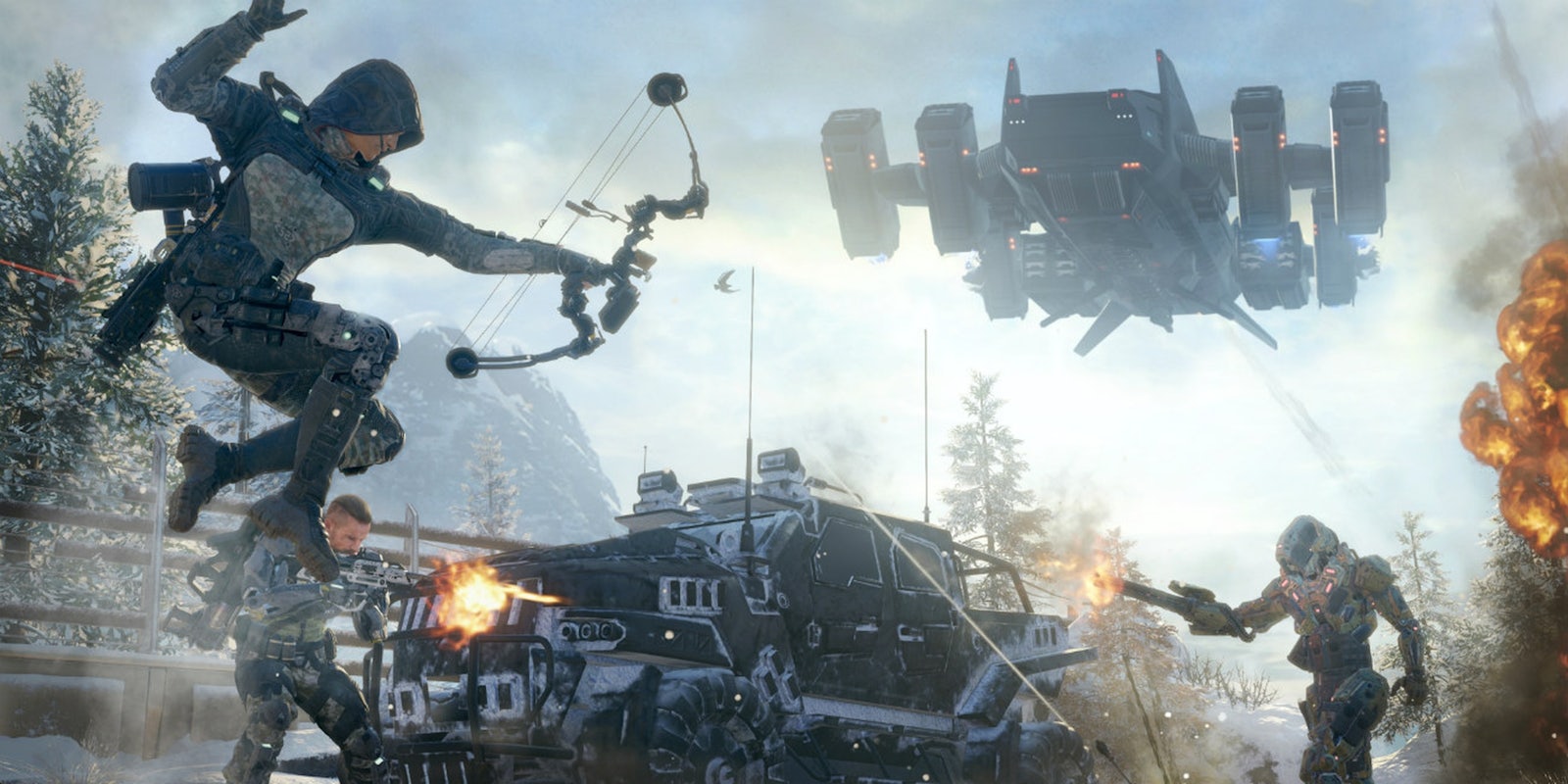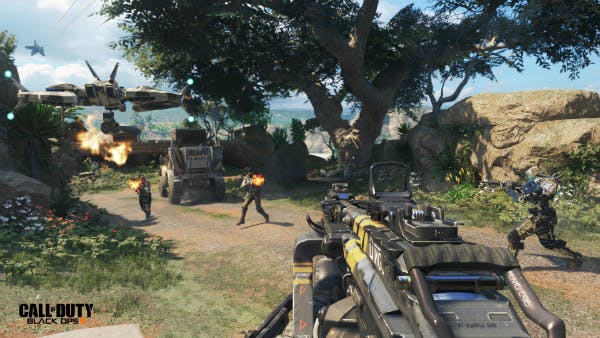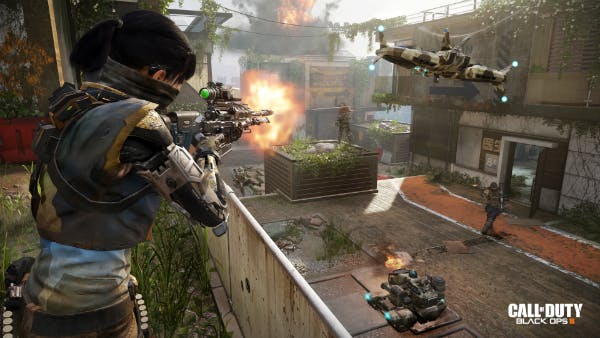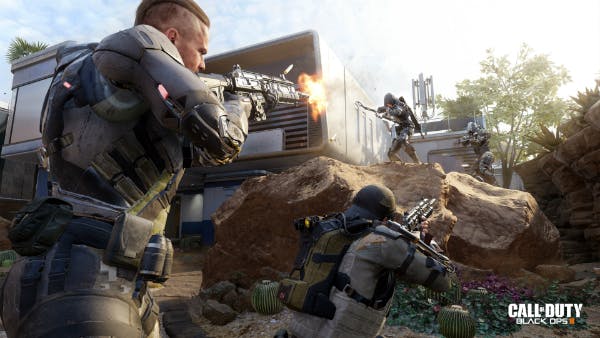I got rocked during my Call of Duty: Black Ops III multiplayer demo at E3 on Thursday. I mean, I was annihilated.
At this year’s Call of Duty Championship held March 27 to 29, $1 million in prize money was on the line. Treyarch, developers of the Black Ops series of CoD games, played a significant role in getting Call of Duty into the esports scene. Now it has to deliver a level of challenge appropriate to that audience.
That probably explains why all of the multiplayer levels featured in my E3 demo were very tight, close-quarters maps with narrow approaches and little in the way of mid-range combat. Call of Duty has for years been one of the twitchiest and most unforgiving first-person shooters in the industry, favoring snap reflexes and featuring very fast respawn times to quickly get players back into the meat grinder.
We spoke with David Vonderhaar, studio design director at Treyarch, about how Black Ops III weaves into the landscape of the Call of Duty franchise, the influence of esports upon its multiplayer design, and whether catering to a younger crowd necessitates an increasingly fast speed of gameplay. The following is an edited transcript of our conversation.
What is your specific role on Call of Duty: Black Ops III?
I’m responsible for the design department for the game, heavy focus on systems design, a lot of time on multiplayer, of course, because it’s a very systems-driven game, all the game progression systems are mine. If it’s about gameplay, it’s in my department. I nerd out on game design shit all day.
What defines a Call of Duty game? I’ve been playing these for 12 years. The original Call of Duty was a reaction to Medal of Honor: Allied Assault, the whole “lone wolf agent” thing. The Call of Duty designers said that’s not what it’s about, we want to have units, we want to show that people…
No one fights alone, remember that?
What’s the common thread, because we’ve had a lot of Call of Dutys now, right?
That’s a great question, man. I wouldn’t be showing any respect to my fellow designers at Treyarch, and other studios that make Call of Duty games [if I answered that]. What I can talk to you about is about what’s important to us from the Black Ops point of view, and what in the series that we’re really here and that we’re to focused on.
Here’s the way to think about it, how I like to talk about this for people who bring up: This is in the future from where you were [in Black Ops II], which was in the future from where you were [in Black Ops I], right? And it’s not about progressing the timeline forward. It’s really about this: Black Ops was a story about man versus man, and a screwed-up narrative that happened with that story. Black Ops II was about man versus machine. That was a story where you have this villain who takes over your own equipment, to fight you with the drones.
What happens when man becomes machine, or machine and man start to become the same thing? That’s a narrative thread that you need to finish the loop on. That’s really what Black Ops III, from that point of view, from a creative point of view, and a storytelling point of view is about. Who’s in control, right? The machines were always controlled by a man, but when a machine and a man is the same thing, where’s the ethics, you know? What happens there. That’s really what winds that loop out, from the first game to this game.
Does anybody on the dev team follow the Call of Duty esports scene?
[Laughs] Yeah.
I can’t make the assumption.
I have personal relationships with pro players, and pro coaches. Black Ops, the first Black Ops, that was the first Call of Duty game that was in the esports scene. We put it there. Call of Duty Black Ops II was the first game with the CoD Championship. You’d be damned straight that Black Ops III is gonna come correct there, too.
Do you ever take feedback from esports athletes, streamers, shoutcasters, are there other connections to esports at the design level?
I mean, I’m telling you, this is a big deal to us. We invited those guys that could play for an hour last night. The game’s gotta be competitive. They have a very unique perspective on what that means, that’s different from the developer perspective. It’s pretty important to check down that perspective.
Does it mean they’re right all the time? No, but to be aware of what they’re thinking is actually really important to us. So we’re very aware.
Do they have input at the design level? There’s a difference between bringing members of the community in to say “We’re thinking about doing X, Y, Z, which of these appeal to you, and which of them don’t?” and “Here’s the build, give us some feedback.”
They had the build. They’re playing it. They’re giving feedback on the build, yesterday.
How much do you take that feedback, in general, and act on it?
I can’t answer your question directly, because the relationships about what they know and don’t know about the game, before the world knows about the game, all that stuff’s NDA with them. It’s not really appropriate to discuss the relationship that exists outside there.
Of course, we’ve known these guys for five years, six years at this point, some of them? If I have a thought about something, I just text a dude that I know, and I ask what he thinks about it, right? And it’s healthy for the games ecosystem to do that.
That sounds like input at the design level.
Who doesn’t have input at the design level? It’s kind of a weird question for me, because I’m a designer. As a designer, everyone’s got something they’ll want to say about the design, and everybody thinks they’re a game designer. That’s OK.
It’s not like you don’t hire people who have points of view on design, who work in the design department, who are—there’s people who work with us that have played professionally. Wanna be a game designer, come be a game designer, baby! I’m hiring.
What’s the average age of the esports guys that are giving you feedback?
I don’t know, I mean, I guess we would go with 22 to 24. I don’t know. There’s probably a technical answer to that question.
In your mind, when you think about the audience for multiplayer specifically, what age group do you think about? This game is for…
This is an M-rated game. We want the game to be accessible to a broad range of people. There’s people that are 50 and playing the hell out of the game, and there’s people that are 18 and play the hell out of the game. I can tell you very directly that when we sit down to figure out what the game is, at no point are we talking about what age.
What we’re talking about is, what kind of game do we want to make, as a developer, what kind of presentation do we want to put forward, what kind of features do we want to work on, to stay involved in and invested and creative?
Does the fact that you’re working with the esports crowd, who tend to be a younger crowd, does that necessitate designing a game more for younger people, with faster reflexes, a certain style of play? I notice the multiplayer is a lot of CQB. I didn’t see any long-range stuff. That feels very twitchy.
We’re making the game we want to play. Thinking of fast, fluid, and visceral game, these were part of our design goals. The fact that it lines up with esports is fantastic. The game is not, we don’t sit down at the beginning and go, “How many features are we gonna have for esports, and how many features are we gonna have for [publishers], and how many features are we gonna have for a dad that only plays twice a week?” It doesn’t work that way.
When I think about what defines Call of Duty, to me it’s pacing and chaos.
Controlled chaos, for sure.
The pacing of a Call of Duty game has always been faster than Battlefield, or Halo. It’s also been more chaotic. That’s the thread that I would draw between every Call of Duty game.
I’ve never actually thought about how I would define [Call of Duty] in the context of other shooters. We play all sorts of games, not just other shooters. I’ve never really, sort of been like “Call of Duty’s checklist, and then some other shooter’s checklist.” It doesn’t work that way for me at all.
This is a game with a very deliberate, strategic decision made, as part of the design, to wind the combat loop tight. and that implies that it’s going to be very fast, for sure. But, it’s also not meant to go to 100 and stay there. It ebbs and flows. There’s different game modes that it ebbs and flows in, like elimination-based game modes like search and destroy. It ebbs and flows because you earn specialist weapons and abilities, and then lose then. It ebbs and flows because somebody gets a mothership, but then there’s nothing like that for four games after.
Is it fast? Yeah. I’m not gonna make any apologies for a game that’s fluid and fast. I couldn’t really compare its speed to other stuff. It really depends on how you define speed. Is it how fast you move? Is it how long you live? Is it how many times you’re respawning? Is it the score at the end of a match? What defines that?
For me, I want this: I want an ebb and a flow through the game, in a six- to eight-minute period. I want the combat loop to feel real tight. I want you to feel like you can move across the world fluidly, you’re not being stopped or blocked, or feeling frustrated because you don’t have the ability to put your gun up and stay in a fight. That’s the kind of vibe that we’re after, and people seem to react well to that stuff, you know?
But I get your point. There’s people who have said to me, “It’s like faster, faster, faster.” I don’t know how fast you can go. You don’t want to go so fast that you can’t have fun, either.
So if there’s a game that pushes that line first, it’s probably going to be Call of Duty.
There’s lots of fast shooters, though, if you itemize the list of every shooter ever created. PC shooters are quick, too.
Illustration via Activision





